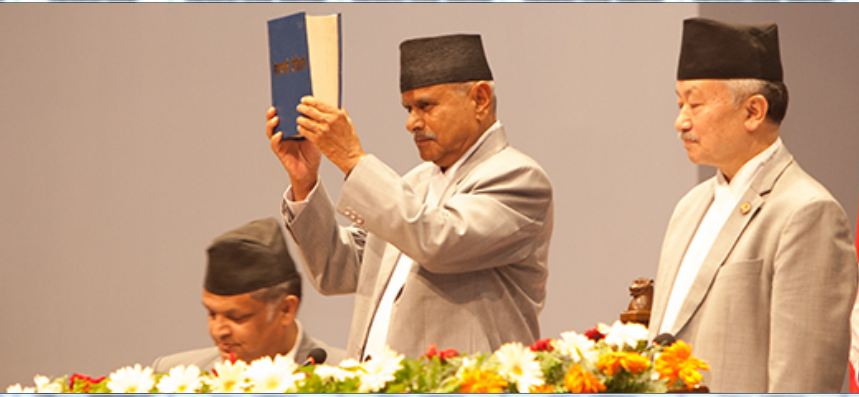
Kathmandu (Pahichan) September 19 – It has been three years since the promulgation of new constitution. The law making process concerning the implementation of fundamental rights has been completed within the time-frame.
Government has celebrated the third anniversary of constitution promulgation with much fanfare. Once again, leaders have praised the constitution saying that it has cemented the rights of all community of society.
Sadly, the rights of sexual and gender minority has been confined in the constitution as this community have not received any constitution. Government’s failure to formulate separate laws has left this community in disarray. All laws relating to fundamental rights have been authenticated by President on Tuesday but none of them has addressed the issues of LGBTI.
This community is continuously demanding to promulgate laws but their demands were not heeded by political parties.The article 16 to 48 of constitution has the provisions of fundamental rights and duties of citizens; article 18 clearly stipulates that there should not be discrimination to his community.
Article 42 of constitution ensures the proportional inclusive representation of this community in state mechanisms. Article 46 states the legal remedy for the implementation fundamental rights. The article 47 states that those laws will be promulgated within three years of constitution promulgation.
With promulgation of new laws, government has claimed that members of this community now have legal ways to receive their rights. Unfortunately, government has thrown cold water to this community not paying attention to formulate laws.
Article 18 has ensured the rights to equality. This provision has ensured the rights of Dalit, women, Madhesi, Tharu, Muslim, farmers, labors, senior citizens, people with disability and other marginalized community.
The constitutional provision also states that government could make special arrangement for the members of this community. Does not it mean that there is a need of separate laws to this community? No one has provided answer to this question. But, there has not been any progress in the last three years.
Ministry of Law is of the view that no one will have to remain without rights but situation is different when it comes to the rights of sexual and gender minority.
Members of this community are not allowed to compete in government job as per their qualification and capacity.
It is still not sure whether members of this community would get the rights of marriage, allocation of properties and rights to adopt the children.
Members of this community are yet to receive the rights to education. Members of this community are asking questions on why they are denied from rights but no one is providing answer.
The article 20 is related to right to justice. The article aims to provide free of cost legal assistances to the people who do not have money. Members of this community have not received free of cost legal service.
The article 24 ensures no one would be discriminated untouchable practices will be ended but members of this community continue to face discrimination in the society. There is no mention of this community in the laws formulated to implement these provisions. The article 31 is related to right to education. This article clearly ensures the right to education for all children in the society and education up to secondary level would be free of cost.
The situation, however, is just opposite: members of this community are not allowed to fill registration forms as per their gender identity. This community is pressing Tribhuwan University to make such provision but there has been hardly some progress. Members of this community are also denied from the rights of health.
Where those laws are related to sexual and gender minority as per the constitutional provisions? There is no alternative to create huge pressure by this community to exercise their rights.
It seems that voices of this community are not so strong so government is not heeding to their demands.
In the first Constituent Assembly (CA), there was the presence of Sunil Babu Pant, a veteran campaigner of sexual and gender minority rights. Pant who tirelessly worked in various thematic committees of Constituent Assembly played a vital role to incorporate this issue in the vital documents. In the second CA, those issues were omitted which clearly shows that the voices of minority would not be heeded. There was no representation of this community in second CA.
In the current set up, there is no representation of this community from grass-root to upper level. Now, time has come to change the method of creating pressure on government. Only in-door programs such as seminar and interaction are not sufficient, we should think about alternative methods create pressures.
Copyright © All right reserved to pahichan.com Site By: Sobij.